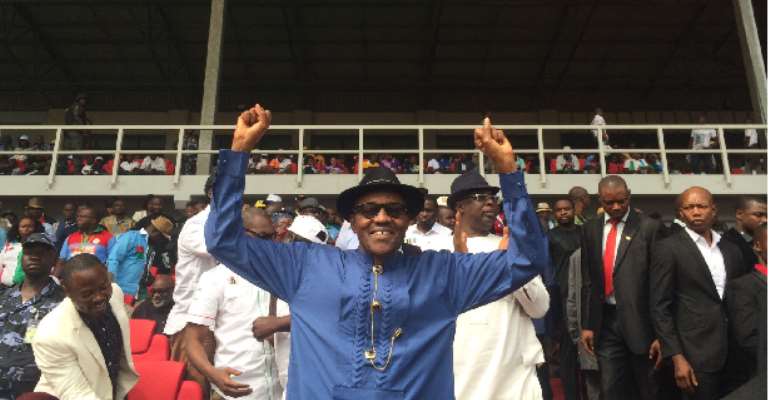GENERAL BUHARI AND THE BURDEN OF EDUCATION

There was once a popular Professor Peller in this country. Nobody cared about his academic profile, nor what he professed for a living, the reason being that he neither posed a challenge to anybody nor was he in competition with those in the academic world. What this means is that you are free to make any claims: call yourself Dr. or Professor, if you wish, and you would go unchallenged until you take that claim to a job interview in competition with others. That, precisely, is what seems to be happening to General Muhammadu Buhari, the Presidential candidate of the All Progressives Congress (APC).
Buhari joined the Nigerian Army in 1962 as a combatant soldier and rose through the ranks to the position of Major-General before he shot his way through in 1983 to become Head of State of the Federal Republic of Nigeria. The details of how Buhari got into the Army, in the first instance, were not clear, nor do we know the exact qualifications with which he entered, all of which have been taken for granted until the General threw his hat into the ring in competition for the President of this country in the election scheduled for February 14, 2015. Section 13 of the Nigerian Constitution stipulates that to be President of the Federal Republic of Nigeria, the candidate must be “educated up to at least the School Certificate Level or its equivalent”.
The issue of Buhari's qualifications came to the public glare because the General was widely reported in the media to have declared, in an affidavit attached to his INEC form, that: “All my academic qualifications, documents as filled in my presidential form, President APC/001/2015, are currently with the Secretary, Military Board as of the time of presenting this affidavit.” Short of denying Buhari's claim, the Military made the rather subtle clarification that General Buhari should be familiar with the process of retrieving any of his credentials in his file.
Up till this moment, no certificate, whether original or copy, has been brought out by the General, no West African School Certificate or GCE, not even the most basic primary school leaving certificate! In fact, Femi Aribisala wrote the other day in the Vanguard of 30th November 2014, that apart from not having any of the foundational qualifications, Buhari also flunked every professional military examination he had taken, which explains why he, unlike most other senior military officers, does not have any post-nominal letters such as fss, psc, mni, etc, after his name. Indeed, if it is true that Buhari does not possess any qualification, then, the National Secretary of the PDP, Prof. Wale Oladipo, was rather generous in describing Buhari as a semi-literate.
Given Buhari's background, he surely went into the profession that suited his less-than-average level of intellectual endowment, especially in his days when the requirements for entry into the Nigerian Army were more of considerations of the recruit's physique and appearance than his mental capacity. To a large extent, it has always been so in human history, as it was well articulated in Plato's Republic, written by the renowned Greek philosopher, who drew a line between the category of men and women who should be professional soldiers and those suitable to be rulers. It is now obvious that Buhari made the colossal error of crossing this line in 1983.
Although Plato talked about the philosopher-king, as the most suitable person to lead society, which essentially is an emphasis on education, we are realistic enough in this country not to be looking for such an ideal man or woman to be the President. Yet, the difference is clear between the two major candidates – General Buhari of the APC who is seeking to occupy the number one position and Dr. Goodluck Ebele Jonathan of the Peoples Democratic Party (PDP) who is seeking to retain the position.
From the campaigns so far, we have a Jonathan who has grown more and more in confidence and experience; who is able to articulate, sector by sector, the challenges facing the country; reel out his achievements in the past years and project ahead what he intends to do, if given the opportunity of a second tenure. On the other side, is a Buhari who, in appearance and thought, remains a man of yesterday; who is barely able to articulate the current situation in the country, understand the complexity of the challenges and tell Nigerians his plan of how to resolve them. All that Buhari is offering is some nebulous concept of “change” and a determination to cleanse the nation of corruption and resolve the challenges of insecurity in some parts of the country, but without telling the people how he will do all this.
Buhari does not have the capacity to understand the complexity of global situations, the operations of the world economy, security management, including the nuances of insurgency and counter-insurgency. His understanding of the President's role in a democracy is shaped by his career and experience as a military dictator; hence, his generosity in declaring his intention to probe and throw Nigerians into jail. Herein lies Buhari's burden of education.
Without mincing words, education is responsible mainly for the difference between Jonathan and Buhari. From ancient to modern times, Plato and other political thinkers as well as the framers of our Constitution, education has always been taken as critical to effective leadership, meaning that the aspiring leader must possess sound education. Not only is education important for a proper grasp of the challenges of democratic governance, it is a necessary instrument for tackling the intricacies of the relations between the Executive on the one hand and the Legislature and Judiciary on the other; for dealing with the freedom of the press, the rights of the workers, the rule of law and the sovereignty of the people. Buhari lacks the intellectual capacity in all this.
Written by Femi Ayelabowo.
[email protected]
